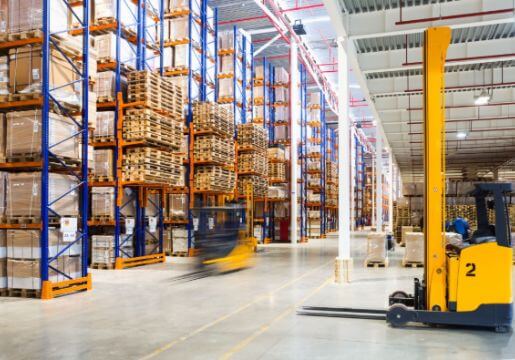Previously, we’ve covered several industry-specific challenges that are commonly faced by your wholesale distribution business.
We’ve also looked at how ERP software have the capabilities to help you resolve these challenges by proving real-time visibility into the underlying processes of your business.
However, not just any ERP software would be equally suitable for your business needs as a wholesale distributor.
And for a wholesale distributor like your business, you’ll need an ERP software with robust capabilities in the specific features which directly address the business challenges specific to your industry.
Because of this, you’ll have to choose your ERP software carefully.
These are some of key features of ERP software that can resolve the industry-specific challenges of your wholesale distribution business.
Here Are 4 Tips On How You Can Future-proof Your Wholesale Distribution Business.
Manage Your Procure-to-Pay Cycle With Inventory Management Features
.jpg?width=1000&name=Manage%20Your%20Procure-to-Pay%20Cycle%20With%20Inventory%20Management%20Features%20(1).jpg)
As a wholesale distributor, inventory management is at the core of your business.
You’ll want to hold just enough stock of a product to meet the current level of customer demand. Too much and you’ll eat additional costs in storage and risk the obsolescence of the product, while too little will risk stock-outs for your business, and cause your customers to turn to your competitors.
To ensure that you have the right amount of stock for your needs, you need an ERP software with a inventory management capabilities that gives you real-time insights into your inventory movements.
For example, SAP Business One is known for being an ERP software with a robust inventory management module. It comes with a comprehensive feature set that helps you manage your procure-to-pay cycle, including but limited to the following steps:
- Requisition order creation
- Purchase order (PO) creation
- Synchronising goods receipts with warehouse inventory levels
- Process accounts payable (AP) invoices
- Recording transactions in the ERP software for future report generation.
With the robust inventory management capabilities of an ERP software like SAP Business One, you’d be able to fulfillment customer orders in a timely manner, while eliminating lost sales and costs from holding excess inventory.
Here's How SAP Business One Can Help Create A Digital Edge For Your Wholesale Distribution SME.
Provide Great Customer Service With Customer And Service Management
.jpg?width=1000&name=Provide%20Great%20Customer%20Service%20With%20Customer%20And%20Service%20Management%20(2).jpg)
Retaining the long-term business of your customer base is key to keeping your wholesale distribution business profitable, so it’s crucial that you’re able to keep them coming back for your services.
And to make that happen, you’ll need to understand your customers’ needs and preferences as much as possible, so that you can better cater to them.
This means you’ll need a solution that can capture relevant data from every interaction with your customers – whether it be customer contacts, sales calls, or transaction histories – and generate the insights that will help you provide a customised service for them.
While these functions are the purview of customer relationship management (CRM) solutions, an integration can augment the CRM solution’s functionalities with complementary features in an ERP software.
For example, the ERP software can serve as a central repository for critical customer data, and synchronise your customer contacts in your CRM solution with other software such as Microsoft Outlook, making it easier for you to make use of them as needed.
Another ERP software feature that will complement your CRM functions is service management, which helps you manage your warranties and service contracts efficiently, and ensure that your business responds promptly to service calls from your customers.
Therefore, when deciding on an ERP software for your wholesale distribution business, you should also consider whether it can be integrated with your CRM software.
Fulfill Customer Orders Effectively With WMS
.jpg?width=1000&name=Fulfill%20Customer%20Orders%20Effectively%20With%20WMS%20(1).jpg)
Obtaining orders from your customers is only the first step, and the goal of your wholesale distribution business is to be able to fulfill these orders effectively.
And with the rise of e-Commerce and online retail in recent years, it’s quite likely you’ll have businesses in this particular sector as a significant part of your customer base.
To fulfill their particular set of online retail-specific needs most effectively, your wholesale distribution business will need to utilise pick and pack fulfillment processes in your warehouses.
This means that the ERP software you choose should ideally have built-in warehouse management system (WMS) functionality, such as is the case with Oracle NetSuite.
Source: Tasklet Factory
Alternatively, you could integrate a third-party WMS solution such as the Mobile WMS solution from Tasklet Factory with a compatible ERP software like Microsoft Dynamics 365 Business Central.
This gives you a solution that can automate your pick, pack and putaway processes, making your order fulfillment processes much more efficient and ensuring timely delivery to your customers.
Recall Products Efficiently With Lot Tracking
![]()
Sometimes, your wholesale distribution business will be required to do a product recall for items for various possible reasons.
For example, if your business handles a product line that turned out to have a serious design flaw, or foodstuffs which were contaminated at some point along the supply chain, you’d have to recall these products to maintain regulatory compliance.
But to conduct a product recall successfully, your business must be able to track the location of your inventory at any point throughout your supply chain.
That means you’ll need an ERP software with lot tracking capabilities, which will give you the end-to-end visibility that’s necessary for you to figure out where the problem with your products lies.
ERP Software Is Key To Tackling Challenges In The Wholesale Distribution Industry
%20(1).png?width=1000&name=Key%20Features%20Wholesale%20Distributors%20Need%20In%20An%20ERP%20Software%20(2)%20(1).png)
With the unique set of business challenges they face in the industry, wholesale distributors like your business must take them into account when deciding which software solution – including ERP software – to implement.
Therefore, your choice of ERP software must offer features which can help you resolve these industry-specific challenges, such as inventory management, lot tracking, customer and service management.
It must also be capable of integrating with third-party solutions, such as CRM and WMS software, which are also key to tackling the common challenges faced by wholesale distributors like your business.
With an ERP software that has these features and functionalities, your business will be well-equipped to tackle the business challenges endemic to the wholesale distribution industry.
It will also put your wholesale distribution business in a good position to tackle new industry challenges in an increasingly omnichannel world. To find out how you can prepare your business to respond effectively to growing customer expectations, click the image below to download our resource and learn more.




